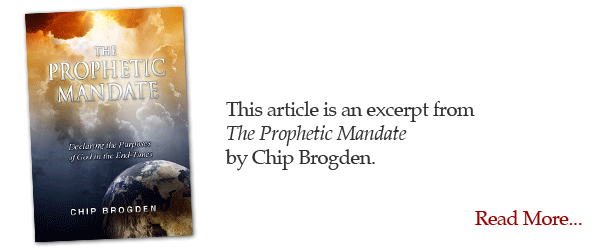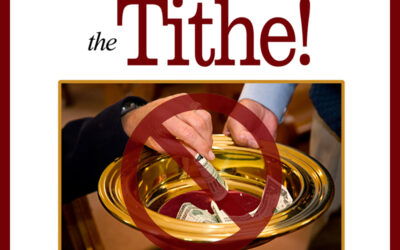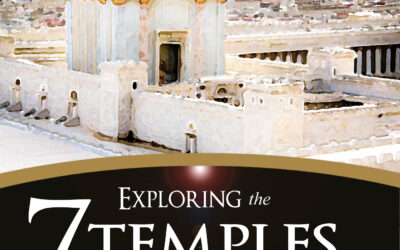We also touched upon the general failure of our current system of organized worship to truly satisfy the heart of God, and how the offering up of ourselves as living sacrifices constitutes ministering to the Lord in Spirit and Truth.
We saw that anyone who has ever been close to fulfilling God’s desire or satisfying His heart has specialized in ministering to Him. We looked at some individuals whose lives are characterized by the fact that they ministered to the Lord, and we saw that the Lord revealed Himself to them in a mighty way. We even made the statement that apart from an intimate relationship with God, founded upon ministering to the Lord, there can be no revelation, no prophetic sense, no depth of knowing Him.
If we could sum up everything said thus far, it would read like this: you were created to love Him, and to be loved by Him. It is all about Him, and not about you or your needs. We are not the center of the universe, He is. He was not created for us, we were created for Him. This is the heart of the matter. When the Lord began to draw me even deeper into this ministry to Him, these are the words He spoke to me: “You were created to love Me, you were created to be loved by Me.” This is such a holy, personal thing that I am reluctant to share it, but I believe it is an open invitation to everyone, not a special invitation for me alone. Even so, why does God want “me” to minister to Him? Who am I? What can I give the Lord? And how does this relate to everything else I am doing for God? I know what it means to teach and write and pray for people and pastor a church; I can get my hands on that, and I used to think that was quite enough. But this thing of ministering to the Lord is a depth that few know anything about. I know so little about it myself. But I do know this much: there is an ocean of difference between ministering FOR the Lord and ministering TO the Lord.
There are a handful of people who are being stirred up to minister TO the Lord. Please understand that WE are not calling forth a remnant of people who are to be more spiritual than the rest. We are simply acknowledging the fact that although many are called by God, few respond; thus, few are chosen. There is a reason why the sons of Zadok were permitted into the Holy Place to minister to the Lord, while the other Levites were to remain in the outer court to minister to the people. This is not happenstance. Some, even now, are hearing the call of the Lord and are leaving the outer court, pressing into the Holy Place to minister to the Lord. We need to understand why. We need to look at the outer court and compare it to the sanctuary. We need to compare the ministry to the people with the ministry to the Lord. The Lord has shared some of the greatest things with me when I simply asked, “Why?” If we know “what” then we know His Will; but if we know “why” then we know His Ways. His Will is His Desire, His Ways are how He goes about to secure His desire. We need to know both if we are to cooperate with Him. So let us examine His Will and His Ways together.
Organized Religion Primarily Concerned With the Outer Court
“And the Levites that are gone away far from me, when Israel went astray, which went astray away from Me after their idols; they shall even bear their iniquity. Yet they shall be ministers in My sanctuary, having charge at the gates of the house, and ministering to the house: they shall slay the burnt offering and the sacrifice for the people, and they shall stand before them to minister unto them (Ezekiel 44:10,11).”
The vision of Ezekiel’s temple is symbolic of the Church. It is beyond the scope of our study to go through and develop that thought into detail, but I mention it so that we understand there is something here which is applicable to us today. If it is only applicable to the Israelites then it has little relevance to us today, but it is, in fact, highly relevant.
There is an outer court, and there is an inner court. There are those who primarily minister to the people, and there are those who primarily minister to the Lord. To begin with, we must look at the outer court so we can understand the inner court. So what is the outer court? It represents ministry to the people, the offering up of sacrifices. It is visible and public, full of action. Its ministers are in plain view and easily identified. There is much work to be done. Because it is public, everyone has access to it. This is where all the activity is. The Levites stand in the outer court to minister to the people.
But read our text again. Who is serving in this outer court? The Levites who went astray and worshipped idols. Part of “bearing their iniquity” is that they are forbidden from drawing near to the Lord in the inner court. They are forever bound to the outer court, the ministry to the people. They are not permitted to go any deeper. Is this not a tragedy? “They shall not come near unto Me, to do the office of a priest unto Me, nor to come near to any of My holy things, in the most holy place: but they shall bear their shame, and their abominations which they have committed (v.13).”
Here is the greatest single problem with Organized Religion: it cannot bring people any deeper into God than it can go itself. Its people are destined to remain in the outer court. Technically speaking, they are “in the sanctuary”, but they are far from God, and cannot draw near to Him. It is better to be out of “church” and “in God” that to be “in church” and “away from God”. How nice it would be to have both, but the reality is that God and “church” often contradict one another. Many have come to realize that they have to choose between the two. The ministers of the outer court are in love with their ministry to the people, with the elements and instruments of the work, and with their status and position in the outer court. They cannot lead us where they are unwilling to go. Of course, I am speaking generally. I think it is wrong to assume that anyone who pastors a church is part of this group. That would be incorrect. We are talking about an inward thing. I am not saying you must leave the outer court in order to obey God. But I will say this: if you are not willing to forsake the ministry of the outer court then you cannot minister in the inner court. You cannot stand in both courts at the same time.
Ministry to People, or Ministry to the Lord?
“These people draw near to Me with their mouth, and they honor Me with their lips, but their hearts are far from Me” (Isaiah 29:13).
Let me get right to the heart of the matter. What is it about Organized Religion that grieves me the most? I think it is this: the impression it gives that there is no inner court at all, that the outer court is all that there is. Everything centers around ministry to the people, and the ministry to the Lord is forgotten, or worse, is done in such a way that it deceives the people into thinking they are ministering to the Lord when they are not.
I wish a pastor could get up in front of the congregation and say, “It is good for us to be here, and it is right for us to fellowship, but you must understand that this is only the outer court. Everything we are doing is for ourselves. We have yet to touch God. There is an inner court in which we stop ministering to one another, and must minister to the Lord. That is where we are going. We cannot be satisfied until the Lord is satisfied.” If this is the pastor’s heart then praise God for it! But how many pastors have you heard say that? And how many, having said it and begun to practice it, would remain in the pastorate for long?
The ministry of the outer court is important, but we have made it important for the wrong reasons. Instead of seeing it as the means through which we enter the inner court, we have made it the entire focus. We are more interested in “curb appeal”, making the outer court look good to visitors and meaningful for those seeking a “worship experience”, while the Lord Himself stands in the inner court, forgotten and ignored. How we feel about the service and whether or not we got anything out of it has become more important than whether or not the Lord’s Need is met. Can you not see how far we have fallen?
May I say frankly that the Lord WILL NOT come forth out of the inner court, out of the Holy Place, to meet you in the outer court, no matter how devoted, sincere, or zealous you are. The way is open in Christ, but you must go to Him, and to do so you must pass through the outer court to get to where He is in the inner court. Now just observe how we do the exact opposite. We gather together in the outer court and pray, shout, sing, worship, and expect the Lord to shower us with His presence or move upon us in a tangible way, i.e., “fall upon us” or “visit us” or “show up”. From start to finish this process takes about thirty minutes to an hour, and sure enough, there is some kind of “manifestation” produced so as to make everyone believe that the Lord responded to them. Nonsense! He will not meet you in the shallowness of the outer court once a week for an hour or so at a time convenient to you and your schedule. You must enter the Holy Place of the inner court to draw near to God. The lesser approaches the Greater, not the other way around.
It may be helpful to go back to the time in my life when the Lord first began to deal with me about ministering to the Lord. Many people believe I had a falling out with the church, and have developed my particular philosophy since then. Quite the opposite, in fact. The Lord began to deal with me and show me things while I was still very much a part of Churchianity. Eventually, my decision to live according to the Truth caused me to have a falling out with the church. So the falling out was the end result of where the revelation brought me, and not the by-product of having been “hurt” or disillusioned (and I always have to emphasize that one can never have a falling out with the True Church, the Body of Christ, because that is not the same thing as Churchianity).
I was occupying my usual place in the church one Sunday morning, singing and worshiping the Lord, just as I had done for countless Sunday mornings my entire life. Nothing unusual or out of the ordinary was going on. It is difficult to describe what I perceived next, but I can only say that a sense of deep loneliness came over me, a sort of grief. Soon I stopped singing altogether and just listened to those around me. Then I opened my eyes and looked around. I had no reason to feel lonely; I perceived that this sensation was not mine, but the Lord was allowing me to share something which was coming from Him.
I realized that we were singing ABOUT the Lord, but not TO the Lord. We were talking ABOUT the Lord, but not TO the Lord. We have seen people do this with senior citizens, talking about them as if they were not present, thinking they do not know the difference, while they silently suffer the humility of being treated as if they are not even there. It was then that I understood that we treat the Lord the same way.
It was not as if this was a particularly bad service. I have been in bad services, and this one was pretty good! But that made it even worse. The better “our” service, the more the Lord seemed to be left out. It was like having a birthday party for someone and getting so excited about the food and the drinks and the music and our new clothes and the presents that we did not notice the person having the birthday is sitting over in the corner, alone. I saw that “our” service really was “ours” – for us, and not for the Lord. The singing, the praying, the preaching, the offering, everything was for us, and WHETHER THE LORD WAS SATISFIED OR NOT we would be there the next Sunday doing the exact same thing BECAUSE IT SATISFIED US.
I was so affected by what had been revealed to me that I sat down, took out a piece of paper, and wrote down these words so I would not forget that moment: “It is not what *I* need or what *I* want. I am come before you, Lord, to meet YOUR Need, to satisfy YOUR Want, to yield to YOUR Desire. I am not come to RECEIVE a single thing from You, but rather to GIVE all that I have and all that I am.” I still have this piece of paper today. In some small way I felt that the Lord was satisfied with this simple surrender; indeed, satisfied and pleased in a way that could not be equaled with all the singing and praying and giving and preaching that we were doing. According to outward appearance, we were “on fire” and “alive”, but I had seen things the way the Lord saw them: “You have a name that you are living, but you are dead” (Revelation 3:1b).
When we see things as God sees them it is a critical moment in our walk with Him. We can easily dismiss the experience and continued on as before. We can argue against it, rationalize it away, or forget about the whole thing. I am convinced that there are hundreds, if not thousands, of people who go through the same experience on Sunday morning but they choose to ignore it. The reality is too painful to deal with, too upsetting to question.
But as I continued to ponder this experience I realized that if what I had seen was true then much of what I had been doing in the Name of Jesus was a waste of time, was not pleasing to God, was not acceptable to God, and did nothing to meet His Need or satisfy His heart. It did, of course, meet MY needs and satisfy MY heart. How wonderful to be in front of the people as they listened to me preach and teach and lead worship! Sunday was the best day of the week, for it was then that everyone could appreciate just what an anointed man of God I really was! They were happy to let me lead them, and I was happy to be their leader, and so everyone was happy. Everyone, it seems, but the Lord, Who called to us from within the inner court while we played “church” in the outer court.
I learned that even something as spiritual-sounding as “wanting His presence” is tainted by the egocentricity of the outer-court worshipper. We want the “presence” so bad that we are willing to manufacture it and give the Lord credit for something which is fleshly and profane. What we really seek is not the “presence”, but the “presents”. As such, we have lost the ability to discern the difference between God and man, between Spirit and flesh, between holy and common. Every new thing which comes along sweeps us right off our feet, and later we wonder how we could have been so deceived, and why we feel so empty inside. We are chasing fantasies and illusions, meetings and manifestations, not the living God of the inner court.
Those Who Minister to the Lord Maintain the Sanctity of the Inner Court
“But the priests, the Levites, the sons of Zadok, that kept the charge of My sanctuary when the children of Israel went astray from Me, they shall come near to Me to minister unto Me, and they shall stand before me to offer unto me the fat and the blood, saith the Lord God: they shall enter into My sanctuary, and they shall come near to My table, to minister unto Me, and they shall keep My charge” (Ezekiel 44:15,16).
Now that we have sufficiently identified the ministry of the outer court we turn our attention to the ministry of the inner court. Keep in mind that this is Ezekiel’s temple, not the Tabernacle, and not the Temple of Solomon. It is different from all others. But we are not trying to identify each individual room or item, we are simply taking note of the difference between the outer and the inner. The outer court is comprised of many things, as is the inner court. But we are more interested in the ministry itself, and how the ministry to people is compared to the ministry to the Lord. These two are NOT the same.
What is significant about the sons of Zadok, and how is it applicable to us today? The sons of Zadok were selected to minister to the Lord because they “kept the charge” of the sanctuary when the children of Israel went astray from the Lord and worshiped idols. In plain language it means this: when things began to decline and the temple was defiled, the sons of Zadok decided they would no longer try to keep the outer court sanctified, but they moved into the inner court and continued to minister to the Lord. When the outer court was defiled, they were determined to maintain the holiness of the inner court.
This is of extreme importance to us. It is no great thing to point out the many ways in which the outer court has fallen, although it surprises me that more people do not see it. Even so, being able to articulate all that is wrong is of very little use if we cannot with equal conviction state what our response to it should be. After we see the problems with the outer court, there seems to be only two viable options: stay where we are and try to change it, or forsake it and go deeper. It seems that all of us, at one time or another, have tried to “change the system” but sooner or later we have met with frustration and aggravation. Immediately when we receive light from the Lord we want everyone else to walk according to that light, but it does not happen. So the only real choice is to go deeper.
The sons of Zadok decided that the outer court was not worth saving, and they sought to preserve the sanctity of the inner court. They did not try to change the outer court, they simply left it in favor of the inner court. It was either that or lose the whole Testimony. Forced to make a choice, they decided to minister to the Lord. Eventually both courts were restored. The sons of Zadok are a type of overcomer, standing in the inner court, ministering to the Lord on behalf of everyone else, thus preserving both courts – even though to the people in the outer court IT SEEMS as if the ones in the inner court are doing nothing. Indeed, IT SEEMS as if the ones in the inner court have disappeared altogether, and they are, perhaps, written off as having “gone astray”, when the exact opposite is true.
“They Will Come Near to Me… and Stand Before Me… and Offer Unto Me…”
“They shall come near to Me to minister unto Me, and they shall stand before Me to offer unto Me the fat and the blood, saith the Lord God” (Ezekiel 44:15b).
Ezekiel 44 illustrates for us what it means to be an overcomer. When the Church as a whole has failed to maintain the Testimony, God will raise up overcomers from within the Church who will maintain the Testimony on behalf of the others who are unable or unwilling to maintain it. People will ask, “Do you think I am an overcomer?” But what does it matter what I think? I know you are called to be an overcomer. But look to yourself and you will know instantly if you are an overcomer or not. Everyone is called to be an overcomer, but alas, everyone does not overcome. We do not overcome because we are overcomers; we are overcomers because we overcome. Read that sentence again very carefully: because being called as an overcomer does not make you one, but living as an overcomer definitely means you are one. There is nothing mystical about it. It bears repeating that the overcomers are no better than the rest, they simply rise up and fulfill God’s original intention for them, while the others do not.
If you are an overcomer then the Testimony of Jesus is present in you. Now looking at things as a whole, while the Testimony may be present in some individuals, it is clear that the corporate Testimony is broken down today. God is not the author of confusion, but confusion abounds in our churches. God is not the author of discord and strife, but discord and strife abounds in our churches. So there is not a clear Testimony – it is, for the most part, unclear at best, and contradictory at worst. The Church as a whole has not fulfilled God’s intention for it. That is another way of saying that the Lord’s Need is not being met. His Desire is not being fulfilled. His Will is not being done. It is not enough for us to examine the outer court and make some cosmetic changes. If we have failed in the ministry of the inner court then we have failed altogether, and THAT is where the root of our problem lies.
Many people have come forward to give us a “New Testament” style or pattern for meeting together. Different forms of church government are being tried. Meeting in cell groups or meeting in homes is being presented as an alternative. The house church has at last begun to call itself a “radical movement”. Before long it may very well turn into a sort of unofficial denomination. We do not want to question or criticize the motives of those involved, and some of these things are well and good, but we want to point out that all of these things pertain to the outer court. Very little if any emphasis is placed on the inner court at all. With some exceptions, there is little ministry to the Lord, no more or less than there is in a “regular” church building. Whether you meet in a church building or in a living room or under a tree, what difference does it make if you are, spiritually and mentally, in the outer court the whole time? It is not a new method or a new system or a new movement that we need, but a new heart that draws near to God to meet His Need in the inner court.
From the ranks of the outer court the Lord is drawing people to minister to Him in the inner court. We are not saying the outer court has no use. Again, we should see the outer court as a means to an End, as the path one must take in order to access the inner court. That is ALL it is, a path. The problem is when we become stymied in the outer court and take up our residence there, when the ministry to the people becomes more important than the ministry to the Lord. Worse, when THAT becomes the End, and we never go deeper, and still worse, when we prevent OTHERS from going deeper. The fact remains that some are discovering a deeper purpose for themselves in God than what lies in the outer court, and are pressing inward. It is not so much a matter of disillusionment as it is a matter of dissatisfaction.
So in the context of this passage, what must happen in order for us to minister to the Lord? It involves two preparatory things: “draw near” and “stand before Me”. We cannot offer anything or do anything until we first draw near to Him and stand before Him. I wonder: how much time have we spent just standing (or sitting or kneeling or lying) before the Lord, just to minister to Him? Is this the foundation for everything we do, or is it an occasional thing we experience, as we try to fit Him into our busy schedule? The Lord of the work is more important than the work of the Lord.
What does the fat and the blood typify? It represents the presentation of our bodies as living sacrifices (Romans 12:1). This temple is unique in that the altar is the center of everything. This temple is a square, and in the middle of the square lies the altar, upon which those who minister to the Lord offer up the fat and the blood. Clearly, the altar represents the Cross, for to minister to the Lord in this way means a complete and thorough death to Self. You see, in the outer court you might be a “somebody”, but in the inner court you are a “nobody”, because in the inner court Christ has the preeminence as All in All. There is no room for your ego or your title or your position. You are shielded from the prying eyes of others, hidden from the praise and the criticism of men.
Another interesting feature is the clothing worn by the priests who minister to the Lord in the inner court. We notice two things: first, they must wear linen so as not to produce any sweat (vv.17,18). Sweat represents the works of the flesh. In the inner court one must learn to stand, not to strive. “Peace, be still” is the order of the day. What a contrast to the noisy activity of the outer court. To not do what the Lord has told us to do is sin, but to go ahead and do what we have not been commanded to do is sin as well. The second thing we notice (v.19) is that they must change their garments when they go out of the inner court, and they must put them on again when they return. They are not allowed to wear their linen into the outer court. Yes, there are times when the priests of the inner court must go into the outer court, and we will discuss that shortly. But the reason for the change of clothing is interesting: “they shall not sanctify the people with their garments.”
In other words, those who minister to the Lord in the inner court are not allowed to impart anything of the inner court to those around them. Again, the God of the inner court will not come forth to meet us in the outer court, we must go to Him in the inner court and offer up the fat and the blood upon the altar by taking up our Cross every day. This simply means that each of us must learn to seek God for ourselves. I cannot carry your Cross, and you cannot carry mine. We cannot rely upon others to touch God for us, no matter how spiritual or holy they seem to be. For that reason, the ones coming forth from the inner court ACCORDING TO OUTWARD APPEARANCE seem no different than anyone else. There is no room for them to glory in themselves. If we are not careful we may disregard them as no different than anyone else, but if we look closely we will sometimes see them “changing clothes” as they pass from the outer court, into the inner court, and back again. This hiddenness is not only characteristic of those who know the Lord, it is absolutely essential. It will require a sensitive heart, a discerning eye, and a listening ear to recognize and learn from them.
They Will Teach What is Acceptable and Unacceptable
“And they shall teach My people the difference between the holy and profane, and cause them to discern between the unclean and the clean” (Ezekiel 44:23).
If I may paraphrase verse 23, I take this to mean, “Those who minister to the Lord in the inner court are best qualified to teach others concerning what does and does not satisfy the Lord and meet His Need.” It may be that we have done quite a number of things which are pleasing to us or to one another but they are not pleasing to the Lord in the slightest. Thus, it is profane, and it is unclean. It is a blemished sacrifice, and it is unacceptable. Again, in Romans 12, we see the terms “holy and acceptable” used in conjunction with the sacrifice of ourselves to God. The converse of that would be “unholy and unacceptable.” Some people think God will just accept whatever we do in His Name. But we know that the Lord accepted Abel and his offering, but rejected Cain and his offering (Genesis 4:4,5).
Our inability to perceive, know, or discern the difference between what is and what is not pleasing to God will open the door to all manner of spiritual and religious deception. Abel knew that the Lord wanted “the fat and the blood”, a life for a life, but Cain offered up something produced by his own sweat (good works) without stopping to the think if he was truly meeting the Lord’s Need. In essence, Abel stood in the inner court while Cain stood in the outer court. Both offered sacrifices, but one was accepted while the other was not. I wonder: out of all the “sacrifices of praise” offered on a Sunday morning, how many are accepted, and how many are rejected? Listen to me! If only we would draw near to God and stand before Him to minister to Him we will come into possession of a remarkable sense of discernment as to the Lord’s Purpose, His Kingdom, His Will, His Desire, His Need. Only then can we offer ourselves as living sacrifices, holy and acceptable to Him. His pleasure will be our pleasure, and His displeasure will be our displeasure. If we do not know what the Lord wants, how can we pray? How can we teach others? How can we obey the Master if we do not know the Master’s will? And how can we know the Master’s will if we do not know the Master? Only those who minister to the Lord can know the Lord.
I mentioned earlier that there are times when the priest of the inner court comes forth into the outer court. Here we see that though their primary ministry is to the Lord, they will on occasion have a ministry to the people. What do they do? They teach others the difference between the holy and the profane, between the unclean and the clean. They will demonstrate the difference between what Abel offers up and what Cain offers up. When the priests come forth from the inner court they teach people how to minister to the Lord, how to meet the Lord’s Need, how to offer up sacrifices that are holy and acceptable to Him. The Hebrew word “teach” in this verse is interesting. Among other things, it means “to lay a foundation” or “to establish”. The basis, the foundation of all ministry is to the Lord first. Learning how to meet the Lord’s Need, and then doing it, is what it means to be a priest of the Lord; teaching others to do it is even more honorable. We are not saying there is no place for ministering to people, but we are saying that it is of secondary importance. If we make the outer court more important than the inner court then we have failed. If we have met everyone’s need it means nothing if the Lord’s Need has not been met.
The altar, the Cross, is central to Ezekiel’s temple, because to devote oneself to minister to the Lord will require a death-attitude to everything outside of the inner court. The praise and the criticism of man, the expectations of people, the demands of family and friends, the many needs and opportunities which present themselves to us, our own aspirations and ambitions about what WE want to do or what WE are gifted to do, our own ideas as to what is holy and unholy, acceptable and unacceptable: all of it must go. Our fruitfulness is not what we are to one another, but what we are to Him.
Summation
“I am their inheritance: and ye shall give them no possession in Israel; I am their possession” (Ezekiel 44:28b).
What does it mean to minister to the Lord? It means…
– Not my will, but Your Will
– Not my Kingdom, but Your Kingdom
– Not my glory, but Your Glory
– Not my needs, but Your Need
It means that in times past we may have served the Lord with the expectation of a future reward, but now we serve the Lord with the realization that He is our Inheritance now. It means that it times past we may have viewed prayer as a way to achieve our own ends, but now we pray in order to ensure that the Lord’s End is achieved. It means in times past we were obsessed with our needs and getting what we wanted, but now we are obsessed with God’s Need, His Desire, and making sure He gets what He wants from us.
It means that in times past our greatest joy was to been seen doing something for God, serving in the outer court, busy with many things; but now, being dissatisfied with that and having discovered Him, our greatest joy is sitting before the Lord in the inner court, quiet and stilled as a child, that we may know Him. In a word, to minister to the Lord is to be content and satisfied, free of ambition, conscious of needing nothing, since He is All in All to us. We were created to love Him; we were created to be loved by Him.
O Lord, make us ministers and priests unto You first and foremost. Teach us to come into the inner court and meet You there. Teach us to seek first Your Kingdom and Your Righteousness, Your Desire, Your Heart, Your Need, Your Satisfaction, Your Glory. You are our Possession, our Inheritance, our Reward. May we never be satisfied with anything less.













